Muzyka, Zeschuk, Morhaime talk change at DICE keynote
DICE 2011: BioWare founders and Blizzard CEO join Zynga's Bruce Shelley, Cerny Games' Mark Cerny in AIAS Hall of Fame-studded panel; console Diablo, WOW vs. Star Wars: TOR discussed.
Who was there: The Academy of Interactive Arts & Sciences pulled no stops for the 2011 DICE Summit's keynote address. Rather than inviting one big name to speak, the organization got five, all of which have been inducted into the AIAS Hall of Fame.

The keynote roundtable, long-windedly titled "Game Changers: A Conversation on the Nature of Interactive Entertainment from some of the Medium's Most Significant Creators," included BioWare's Dr. Ray Muzyka and Dr. Greg Zeschuk, Cerny Games' Mark Cerny, Zynga's Bruce Shelley, and Blizzard's Mike Morhaime.
What they talked about: Following opening remarks by AIAS president Martin Rae, the distinguished panel took the stage, with the moderator opening up the panel with the simple question, "What's on your mind?"
Zeschuk stepped up first by introducing the concept of change, saying that an enormous amount of it is occurring within the industry right now. Change is the reality, he said, and game makers all have to deal with it, but he emphasized that it's an exciting time. Muzyka agreed, saying that the industry is playing out in an S-shaped curve and that a lot of existing companies must adapt if they want to survive. He said that it's also exciting to see what new players in the industry bring to the table.
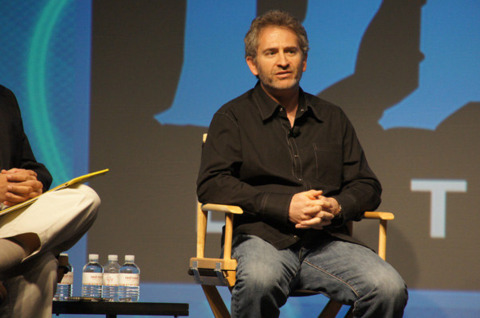
Cerny commented that he's actually jealous of Shelley, saying that the Zynga creator can get a new game done faster than he can get a lawyer assigned to a contract. As for Shelley, he said that it is once again exciting to be a new player in the industry, after several years in which the industry slogged through the economic slump.
Morhaime also said he believes it is a very exciting time to be in, on account of widespread change. However, he believes that the industry has never stopped changing, and this idea is not new. The industry has always had to look ahead and take advantage of opportunities, he said. Continuing, Morhaime said that for a while, it was very difficult to start up a new studio, but new markets have arisen, new ways to play have emerged, and it's all very positive and healthy for the industry that small teams can make gaming experiences again.
The moderator then shifted the conversation toward what's new and hot that the panel has been playing. Again Zeschuk led, saying that he makes a point of playing as many other games as he can. Zynga's CityVille, in particular, caught his attention, he said, and he brought in his lead designers to look at the game, proclaiming it to be the future.
As for his BioWare counterpart, Muzyka has been most recently infatuated with Rockstar Games' Red Dead Redemption, and he noted that it is a prime example of how large studios and teams can still make something "magnificent." It's true for big games and small games, he says, and we are starting to see greater depth in social and casual games. He also lauded the fact that social and casual games are beginning to exhibit a greater degree of depth, saying that they are making the industry more accessible to a wider audience.
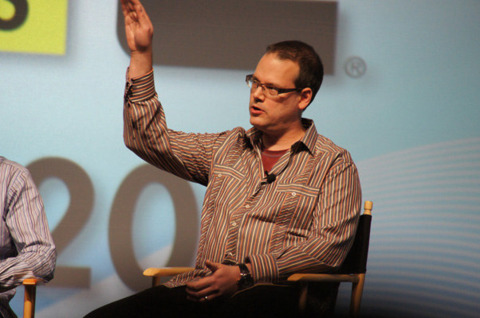
The moderator then asked Muzyka what he would have "stolen" from Red Dead Redemption, in the vein of the old maxim "Good writers borrow, greater writers steal." He said that he often looks to other games for inspiration and that with Red Dead, the sense of exploration and the open world is what impressed him. That Rockstar applied this to a Western world is what surprised him. Also, the depth and small details were especially good. Almost every aspect of the content, he concluded, was worth stealing.
Picking back up with the "games that inspire" line of questioning, Cerny said that he is infatuated with Thatgamecompany's Flower. Calling the game design fearless, he said that Flower represents a total commitment to an idea. In particular, Flower operates as art, he continued, saying that the game is the dream of a flower. Further, he lauded the fact that it is not relentlessly goal driven in a way that would interfere with its ability to function in other ways.
Shelley was particularly impressed with FrontierVille, a game that was made before he joined Zynga. He said CityVille opened his eyes to the potential of the kinds of games that Zynga is creating and that he was surprised by how clever and addictive it was.
Shelley is then asked whether he sees Zynga's game design as motivated too much by monetization efforts. While declining to comment on Zynga's design philosophy, he said that he personally was convinced that wasn't the case after interacting with Brian Reynolds and the rest of the company's design team. These games are just a start, he said, and he wonders what kind of depth and quality Blizzard could achieve in the free-to-play market.
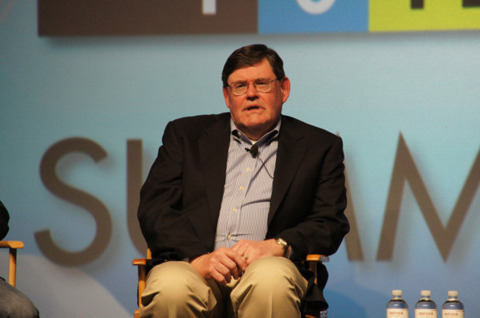
As for Morhaime, he said that when at home, he's mostly playing Blizzard games. However, he also expressed optimism over mobile gaming. Words With Friends, in particular, is his game of choice, and he brought up the point that playing with friends always deepens the engagement and connection.
With Morhaime's presence on the stage noted, Zeschuk and Muzyka were then asked how they hope to compete in the massively multiplayer online space, and in particular, what can they bring to the table. Zeschuk began by noting that World of Warcraft remains the touchstone in the industry, and it proves that big games still work. He also said that because of WOW's influence, it is important to maintain the standards that the game established.
That said, Zeschuk noted that anyone who plays Star Wars: The Old Republic will see that it is a BioWare game. Second, he said that they aren't going out there to beat anyone, in that they aren't positing the game as the oft-feared, never-materialized WOW killer. Lastly, Zeshuck said that delivering superior service is of the utmost importance for BioWare, even if it is an incredibly intimidating project to take on.
Muzyka then chimed in, saying that BioWare does, in fact, have ample experience in the field of games-as-service, given many team members' backgrounds with Mythic Entertainment. For BioWare, he said, it's about collaboration, as well as finding the best and the brightest and building off of their communal experience.
Morhaime was then asked if BioWare's title is causing more anxiety than previous competitors. In a diplomatic response, he praised BioWare and the Star Wars license, saying only that he ultimately thinks it's good for the genre when good, fun competitors come out. Conversely, when bad MMOs come out, it is a disservice to the genre and can cause potential new players to get frustrated and give up on the genre.
As a follow-up, Morhaime is asked about what kind of experiences Blizzard would like to provide to players in the future that aren't currently being provided now. He said that some of Blizzard's most experienced developers are working on the company's new project, and they are attempting to apply the lessons they've learned throughout the years. Some of these insights have been addressed in WOW, he said, but others require a clean slate to do properly.
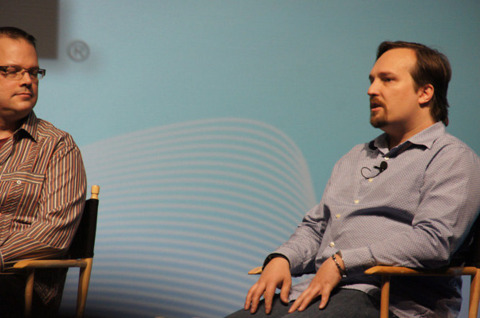
Blizzard is trying to do something new and fresh in the MMO genre, he continued, emphasizing that the new project is not a WOW sequel. The studio envisions these two games will coexist in the future and that the least he can say on the issue is that games are more fun when players are experiencing them with others.
Shelley was then asked about the idea of players being able to have some direct effect on the play experience of others, whether called "griefing" or "emergent gameplay." Head-to-head competition isn't a core tenet of Zynga's currently lineup, he responded, noting that this omission isn't necessarily a bad thing. Shelley said he believes there are a lot of different experiences and ways to play games, and it isn't necessary to put every piece in one box.
Back to Morhaime, the moderator asks whether, given the industry's current climate, console gaming is a necessary part of the company's business plan going forward. Morhaime says that it isn't, but then noted that many people enjoy console games and that whenever the company starts up a new project, they always look at all relevant platforms.
He went on to note that the Diablo franchise in particular is one that could work on consoles. "We're actually doing an investigation into that," he confirmed, saying also that a number of outstanding issues would need to be solved before the company commits to bringing the franchise to consoles.
The moderator then moved the discussion toward mistakes, with Zeschuk offering a tale from many years ago--the attempt to create a kung fu fighter using the Baldur's Gate engine. Apparently, because cutscenes were difficult and time consuming during that period, he made an equally foolish decision to simply use old kung fu movie footage and dub over what was being said. Needless to say, that project never saw the light of day.
Cerny, whose credits include the revered original Crash Bandicoot series, said that one of his biggest mistakes involved that series. Specifically, it centered upon the team's decision to create an eight- to nine-hour game, give the player only five lives, and then send them back to the beginning if they ran out. "I have no idea why we were doing that in 1996," he lamented.
Shelley's big mistake, he said, involved Age of Empires III. He said that the team attempted to incorporate too many features from other popular real-time strategy titles from that time period. When many of these ideas didn't work out, the team lost focus on the essence of what makes an Age of Empires game, and the product lost coherence.
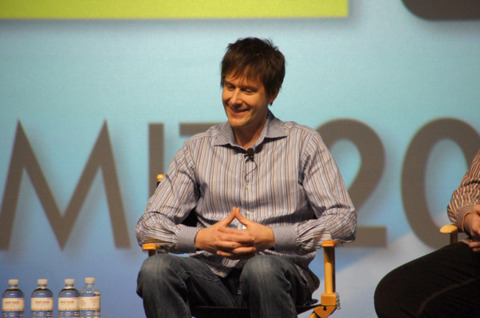
Morhaime said that he was actually on the wrong side of a good decision with the original Starcraft. With only a few weeks left before the game's launch, Command & Conquer was released and introduced a new way of interacting with the map. This right-click interface, Morhaime felt, would have jeopardized the project if implemented, even though it was clearly better than what was in Starcraft at the time. However, Allen Adham went around Morhaime, taking the idea directly to the programming team, and it was ultimately very successful.
Quote:"So, you know, do a good job."--Mike Morhaime, offering advice to BioWare's Ray Muzyka and Greg Zeschuk for the upcoming MMO game Star Wars: The Old Republic.
Takeaway: Despite the wealth of old dogs on the stage, one common opinion was that the gaming industry is an industry of change, and it is important to embrace this fact to stay relevant. Along with hard work and talent, the panelists seemed to agree that the ability to take change in stride is one of the best ways to come out on the winning side of history.
Got a news tip or want to contact us directly? Email news@gamespot.com
Join the conversation